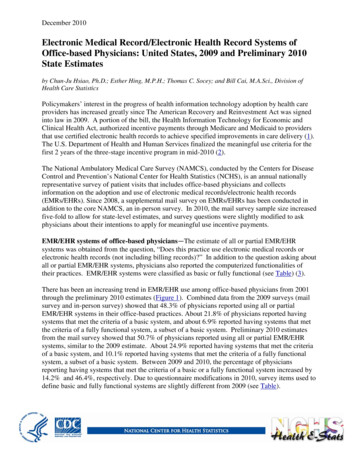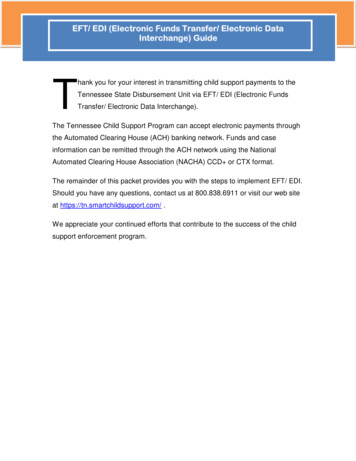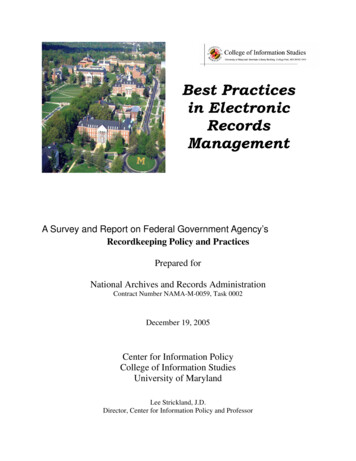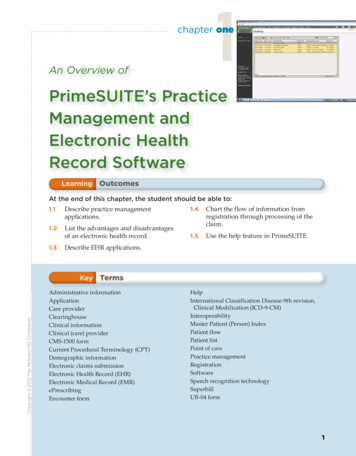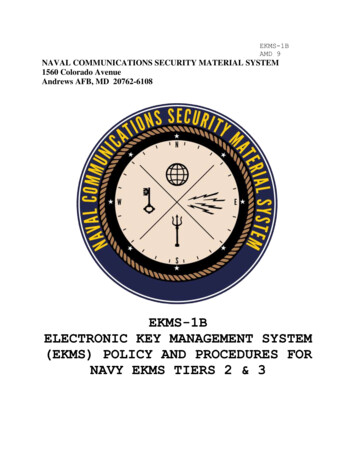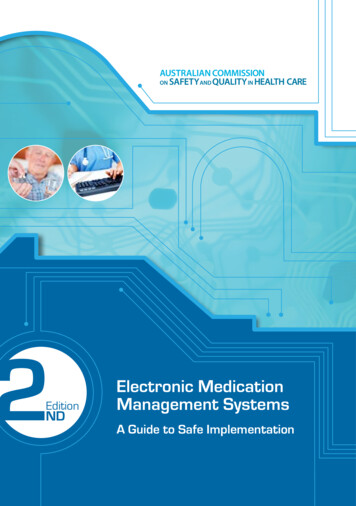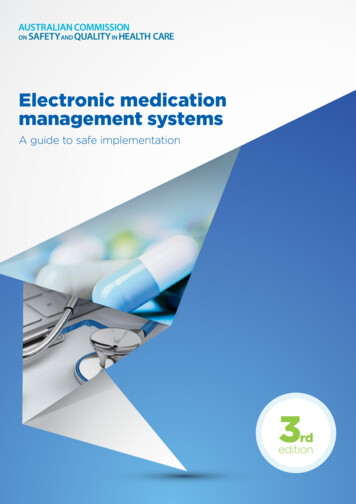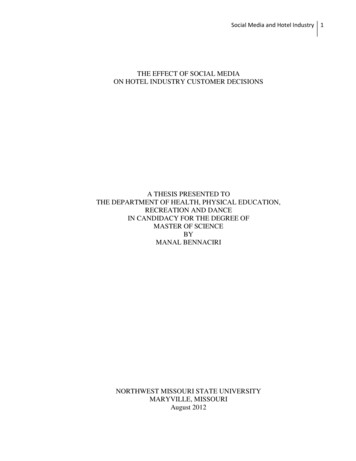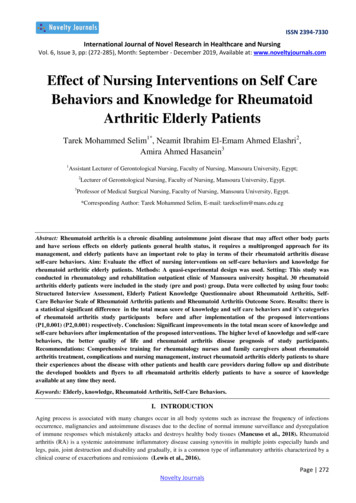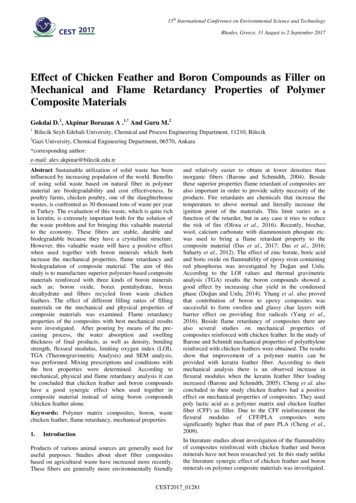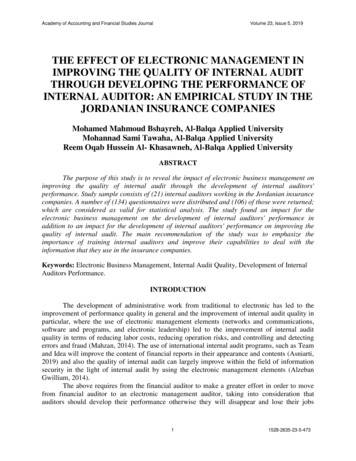
Transcription
Academy of Accounting and Financial Studies JournalVolume 23, Issue 5, 2019THE EFFECT OF ELECTRONIC MANAGEMENT INIMPROVING THE QUALITY OF INTERNAL AUDITTHROUGH DEVELOPING THE PERFORMANCE OFINTERNAL AUDITOR: AN EMPIRICAL STUDY IN THEJORDANIAN INSURANCE COMPANIESMohamed Mahmoud Bshayreh, Al-Balqa Applied UniversityMohannad Sami Tawaha, Al-Balqa Applied UniversityReem Oqab Hussein Al- Khasawneh, Al-Balqa Applied UniversityABSTRACTThe purpose of this study is to reveal the impact of electronic business management onimproving the quality of internal audit through the development of internal auditors'performance. Study sample consists of (21) internal auditors working in the Jordanian insurancecompanies. A number of (134) questionnaires were distributed and (106) of those were returned;which are considered as valid for statistical analysis. The study found an impact for theelectronic business management on the development of internal auditors' performance inaddition to an impact for the development of internal auditors' performance on improving thequality of internal audit. The main recommendation of the study was to emphasize theimportance of training internal auditors and improve their capabilities to deal with theinformation that they use in the insurance companies.Keywords: Electronic Business Management, Internal Audit Quality, Development of InternalAuditors Performance.INTRODUCTIONThe development of administrative work from traditional to electronic has led to theimprovement of performance quality in general and the improvement of internal audit quality inparticular, where the use of electronic management elements (networks and communications,software and programs, and electronic leadership) led to the improvement of internal auditquality in terms of reducing labor costs, reducing operation risks, and controlling and detectingerrors and fraud (Mahzan, 2014). The use of international internal audit programs, such as Teamand Idea will improve the content of financial reports in their appearance and contents (Asniarti,2019) and also the quality of internal audit can largely improve within the field of informationsecurity in the light of internal audit by using the electronic management elements (AlzebanGwilliam, 2014).The above requires from the financial auditor to make a greater effort in order to movefrom financial auditor to an electronic management auditor, taking into consideration thatauditors should develop their performance otherwise they will disappear and lose their jobs11528-2635-23-5-473
Academy of Accounting and Financial Studies JournalVolume 23, Issue 5, 2019(Kotb, 2015) as declared in the internal audit standard (401) "Audit in the environment ofcomputer-based information systems".The gap that has emerged in literature reside is the focus of most literature on the work ofinternal financial auditor as well as in the search of internal audit quality in terms of thequalification level of internal auditors financially and in terms of their compliance with theinternal audit standards, therefore we preferred in this research to study the impact of electronicmanagement elements on the improvement of internal audit quality through the development ofinternal auditor performance.DISCUSSION OF THE STUDY DEPENDENT & INDEPENDENT VARIABLESThe Role of Electronic Management on Developing the Performance of Internal AuditorThe accomplishment of operations in the electronic business environment consider one ofthe most important career development methods that work on improving the performancequality, which requires the internal auditors to work under complex circumstances within thecomputerized systems and software programs, the huge data inputs, and the way to process thesedata electronically which consider a major challenge for the internal auditor Joseph (2014).Kotb et al. (2014) sees that financial auditor's experience isn't more than a majorrequirement for the auditing of financial processes but it’s necessary to use informationtechnology (IT) in the audit process to increase the efficiency and effectiveness, while the lack ofauditors who are capable of dealing with the information systems will require from companymanagement to train the financial auditors on IT where Güney, Aysel (2014) found that internalauditors must own the right knowledge of accounting systems due to their involvement in theestablishment and development of accounting programs in the company.Auditors need the scientific and practical qualification, and the training to work in theelectronic management environment which stands on the computer networks, software,communications, and databases Anacom (2014) and therefore auditors are required to complywith the international audit standard (ISA) 401 which states "auditing must be done in acomputer aided information systems environment". Internal auditors are aware of the risks levelof operations implemented by the electronic management and the use of IT tools, therefore theinternal auditors are required to comply with the international audit standards related to the ITenvironment, especially ISA 401 and they must also comply with ISA that reduce the operationaland IT risks to enhance the integrity and security of accounting information which agree with thestudy results of Alzeban & Gwilliam (2014).In a related context; the researcher’s yang & Juan (2004) discussed the responsivenesslevel of internal audit profession to the rapid development of IT environment, and the studyindicated that the use of IT techniques in the management and implementation of audit work wasa major reason for the performance development of its operational processes. The AmericanInstitute of Certified Public Accountants (AICPA) and the Information Systems Audit andControl Association (ISACA) have issued standards to facilitate work of the internal auditor inlight of the electronic business management, and Bshayreh (2016) believes that electronicmanagement elements enable the internal control management to accomplish its tasks in anorderly manner, especially in light of using communication networks and databases in themanagement of its businesses which require from the internal auditors to work professionally inthis environment, Bataineh (2017).21528-2635-23-5-473
Academy of Accounting and Financial Studies JournalVolume 23, Issue 5, 2019The work in electronic management environment requires from auditors to becomeelectronic auditors and they need to be aware of the difficulties that face auditing, due to the useof computer systems which requires modification in the auditing functional skills of the auditorsto give it a technological nature with the emphasis that this technology will help the internalauditors to reduce the operational risks of auditing functions, such as non-discovery risks and theinherited risks, Linda Hadden et al. (2003) & Moorthy, et al. (2011).Internal Audit Quality ImprovementThe quality standards of internal audit are represented with ISA 65 issued by AICPA andthese standards show in the availability level of internal auditors professional capability,objectivity, and performance quality represented by the efficiency of internal audit proceduresand emphasized that computerized systems utilization will enable the internal auditor ofimproving the quality of internal audit by improving the accuracy level, reducing auditing costs,and reducing the risks of auditing process Moorthy, et al. (2011). Al-Mansi et al. (2015) sees thatthe use of software, databases, and expert systems will help to improve the quality of employee'sperformance at the organization. This study, which targets the internal auditors confirmed thatthe use of electronic management elements will improve the quality of internal audit byimproving the quality of audited financial statements outputs.Asniarti, et al. (2019( believes that the auditing quality reside in reducing the risks ofelectronic data processing and suggest that these risks happened in two phases; input and processwhere reducing it will lead to an improvement in the auditing outputs. Auditing process throughthe use of IT doesn't differ in its goals but requires from the internal auditors to deal with thecomputer system components and master additional skills.The transformation of processes from paper to IT led to increasing the possibility ofmaking auditing mistakes due to the use of IT and this development forced the internal auditorsto master new skills that weren't previously required, therefore auditors are required to beproficient in dealing with IT in order to reduce the risks of potential mistakes as a result of usingthese systems Kotb et al. (2014). Some studies also emphasized that the use of computers in thedifferent auditing areas will help to reduce the time spent to complete the written and accountingprocesses, and the selection of random samples. These computerized systems also helped toreduce the overall costs of auditing processes and helped to increase the accuracy of outputswhich makes it easy to review and make improvement thereupon.The mutual relationship between the electronic management and the internal auditprofession impose certain controls and constraints to audit the electronic businesses which makesit essential to pay attention to the information security and privacy which requires to follow-upon all stages of auditing process to ensure that tasks are performed properly in order to reducethe risks of using these computerized systems Arens et al. (2003). It emphasized the need to payattention to the operational risks sources of these systems and works to reduce it to an acceptablelevel and also emphasized the importance of control procedures on the programs in term ofinputs and outputs which finally lead to the improvement of internal audit quality Weidenmier etal. (2006).Study ModelThis study depends on the electronic management elements as the independent variables,the improvement of internal audit quality as the dependent variable, and the intermediate variable31528-2635-23-5-473
Academy of Accounting and Financial Studies JournalVolume 23, Issue 5, 2019related to the development of internal auditor performance, where the following Figure 1represents the study model:DependentVariableIndependent Variables--- Networks &Communications- Software-Electronic Leadership-IntermediateVariableDevelopmentof InternalAuditorPerformanceImprovement ofInternal AuditQualityFIGURE 1STUDY VARIABLESStudy Methodology & Descriptive Analysis ResultsThis study depends on the descriptive analytical approach where this aspect deals with apresentation of the study methodology by reviewing the stages and steps used to achieve thestudy objectives.Study VariablesIntermediate Variable: Develop the Internal Auditor PerformanceKotb et al. (2014) mentioned the variable of internal auditor performance development inthe light of electronic business management and distributed a questionnaire that contained (22)online questions on the internal auditors in the USA and UK. The study concluded that it isimportant for the internal auditors to develop their performances and skills by using ICT and tomove from the financial audit to the audit in a computer-based environment Kotb et al. (2014)while Kolk (2017) studied the change in auditors tasks within the presence of IT and wasconcerned of determining the way to develop the internal auditor performance by assessing thecompliance with the profession standards with emphasis on the skills of auditors by using ITduring their work. The author did put (4) questions for this field that were distributed on (1,382)auditors in Netherlands, and the study found that auditors tasks have changed in light of the workin IT environment where the auditors became in need to develop their performances. ButJayalakshmy (2005) studied the changes in the roles and functions of auditors where theresearcher used the descriptive approach by studying the previous researches, books, and articlesin this field. The most important results of the study indicated that working in the ITenvironment will force the internal auditors to develop their work electronic skills.Through the previous studies above that were related to the study variables, the followingfirst hypothesis was formulated:41528-2635-23-5-473
Academy of Accounting and Financial Studies JournalVolume 23, Issue 5, 2019H1: There is no impact for the electronic management elements on the development of internal auditorperformance at the Jordanian insurance companies.Dependent Variable: Improving the Quality of Internal AuditNwankpa (2014) studied the digital management environment and its impact on thequality of internal audit and the researcher used the descriptive method to gather information andfulfill the results; where the most important results of the study were that digital managementworks to improve the quality of reports, reduce the errors and fraud, and reduce the risks ofoperations while Mahzan (2014) studied the quality of auditing process using the computer andIT technologies where the most important results of the study indicated that the adoption ofinternal audit software like CAATT software will be necessary to improve the quality of internalaudit in terms of reducing operational audit risks.The Study of Asniarti et al. (2019) examined the impact of computer use and techniquesin the internal audit where researcher used the questionnaire to collect data and the MultipleRegression Test to test the hypotheses. The most important results of the study indicate thatwhenever internal auditors use IT tools it will lead to accuracy, speed, reduction of audit costs,and better information security and privacy.We notice negligence on the part of researchers in dealing with the electronic operatingerrors when measuring the dimensions of internal audit quality, where researchers should havedeveloped the dimensions of internal audit quality to include error-free auditing process, dataentry processing and outp
electronic auditors and they need to be aware of the difficulties that face auditing, due to the use of computer systems which requires modification in the auditing functional skills of the auditors to give it a technological nature with the emphasis that this technology will help the internal auditors to reduce the operational risks of auditing functions, such as non-discovery risks and the .
